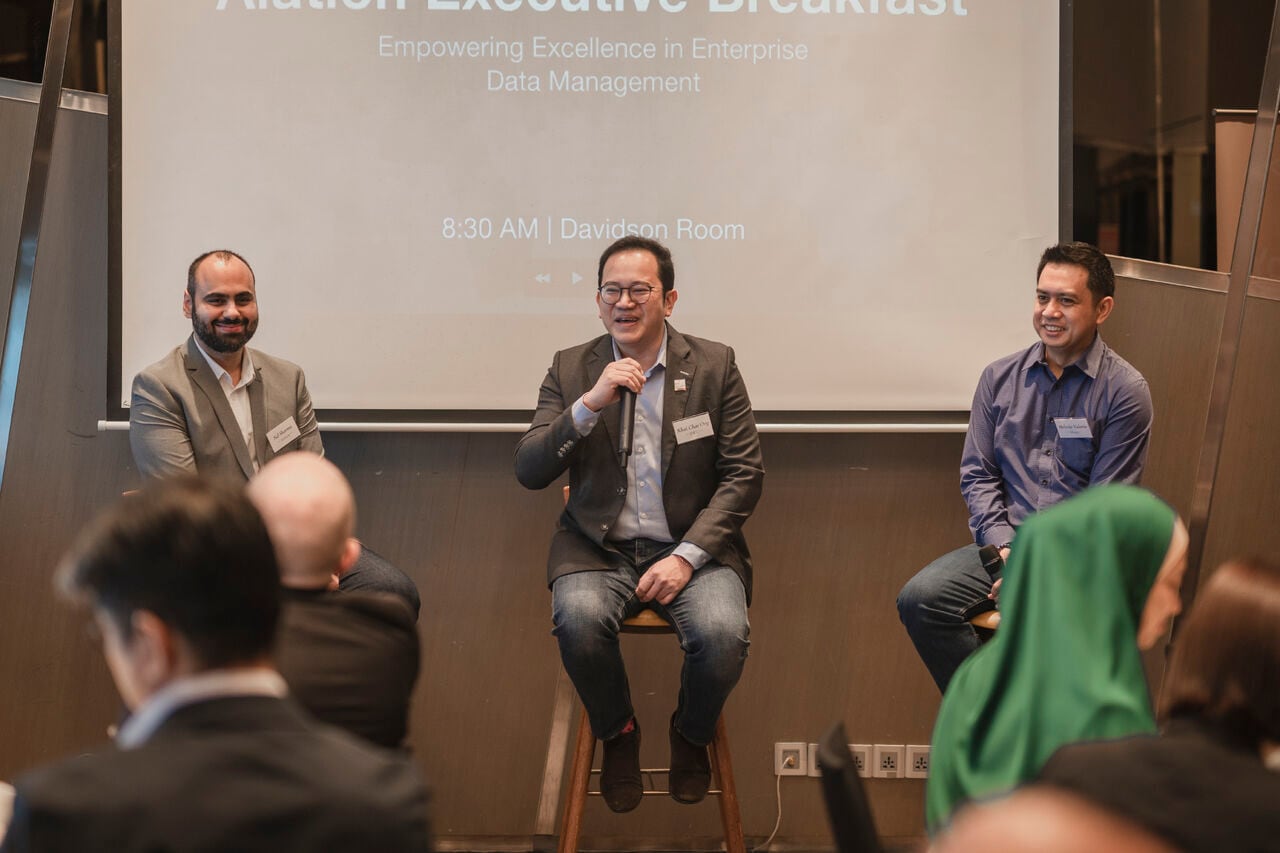On Thursday, June 27, 2024, in Kuala Lumpur, the Alation Executive Breakfast brought together some of the brightest minds in enterprise data management today. With the theme ‘Empowering excellence in enterprise data management,’ this event was an exceptional gathering of industry leaders and data professionals, all united by a shared passion for harnessing the power of data to drive innovation and excellence.
Alation Executive Breakfast in Malaysia
The discussion was moderated by Sid Sharma, Regional VP Sales, Asia, Alation, and featured insights from Mel Valerio, Head of Data Governance at Maya (a Filipino financial services and digital payments company), as well as Khai Chiat Ong (‘KC’), Data and Analytics Partner at PwC Malaysia. Together, they explored the intricacies of building a successful data culture, strengthening data governance, leveraging active metadata, and advancing organisational data maturity.
What follows is a recap of the key takeaways (some of which have been edited for clarity). Let’s dive in!
Data governance is a journey
Mel Valerio shared insights into the initiation and evolution of the data governance programme at Maya. The journey began with a strategic approach to standardising business terms and data dictionaries using Excel as a unified template across all business units. This early method ensured consistency and prepared the foundation for the future. As the company expanded, particularly with the growth of its digital bank, the need for a more robust solution became evident. The company has transitioned to advanced data governance platforms, capable of managing the increasing data volumes and complexity with greater efficiency and precision.
A platform that supported automation was essential. Due to the high costs of experts’ time, ‘I don't have a lot of resources to do manual work,’ he explains. ‘So I want them to really focus on strategy, really focus on automation. And we need to have the right tool in order to do that.’ Valerio’s journey highlighted the importance of having a robust foundation for data management and governance.
Establish clear data roles
A significant factor in Maya's success was the establishment of clear data responsibilities. This ensured that everyone, from technical teams to business units, understood their roles and how to collaborate effectively. The creation of a self-service platform for data-related issues further streamlined communication and problem resolution.
‘We do have a common vision… and a framework [so] that, every one of us knows our roles and responsibilities,’ Valerio shares. ‘At the same time, the business knows exactly who to talk to or who to reach out to if there are some data concerns.’ Valerio’s team created a self-service platform they’ve called the data analytics intake process, where ‘everyone from the business, teams, any department or any business unit [is] able to raise a concern… then data governance [can] triage who should be the rightful owner [and the] actions to be taken.’
Critical data elements are key for an AI and data-driven culture
To realise Maya's goal of becoming an AI-first company, Valerio’s team has focused on data governance to ensure responsible and ethical AI deployment. He shared how they focused on identifying critical data elements (CDEs), maintaining high data quality, and building a metadata repository.
‘Since we are very highly regulated by our central bank, (plus the fact that the data users are the primary data users, [as well as the] data science and AI and data analytics teams), we identified which are those critical data elements that will affect their models, dashboards, and insights,’ he explains. ‘So we started that way and put all those in a metadata repository. So from there, everyone will see, what's the meaning of terms like “past due” and all of that.’
Secure stakeholder and cultural buy-in
The discussion highlighted the critical role of senior stakeholder support in driving data governance and AI initiatives. KC from PwC Malaysia emphasised the importance of aligning digital and data strategies with business goals and fostering a culture that drives data value. Successful organisations have strong senior leadership backing and a culture that integrates data practices seamlessly into business operations.
‘The most successful strategy… is when the buy in comes from very senior stakeholders,’ he says, pointing to the CSO, CEO and board as key supporters. He also emphasises the need for a ‘quick win’ to generate momentum, sharing that ‘there must be some pilot win, use case, or value realisation that convinces the stakeholders. So that is the duty of the technologist to make it happen and make it real.’
‘Culture eats strategy for breakfast,’ he adds. ‘Ultimately the culture has to move as well. Also remember the people factor. The people factor ultimately will determine how the organisation… puts data and strategy on steroids to help them move further.’
New organisations can build a robust data foundation
KC pointed out the varying stages of data maturity among organisations in Southeast Asia. Some have abundant data but struggle to utilise it effectively, while others lack sufficient data but are eager to advance their capabilities. What’s more, new organisations have the advantage of designing their data architecture from scratch.
‘You start fresh, you get your chance to define the data architecture you want,’ he expands. ‘You get the chance to then build the platform that you want. You get the chance to influence. Then that becomes a data-led company.’ Understanding these differences, based on organisational maturity, is crucial for tailoring data strategies to each firm’s unique context and challenges.
Organisations should leverage existing technologies and resources to accelerate their data initiatives. It’s important to align data projects with the organisation’s vision and capabilities, rather than aiming for unrealistic maturity levels. Collaborating with external partners can also help in propelling the organisation forward.
To grasp data’s ROI, look to time savings and regulations
The discussion emphasised the importance of measuring the ROI on data. It was noted that ROI can be both tangible and intangible. Tangible ROI includes cost savings from avoiding regulatory penalties due to data quality issues, while intangible ROI covers aspects like reputational risk.
‘Let's say if we do a data governance [project]...’ KC begins. ‘How long does that currently take? …the infrastructure is also very important. For example, you have good data technology, and so on. But you also need a good data model…The actual model that fits your organisation makes your data easy to find, easy to mine.’
Effective data governance, where data is well-documented and understood, helps organisations avoid costly mistakes which include regulatory issues. KC points to governance frameworks as delivering clear time savings when he says, ‘The fashion of how governance is implemented… equates to how effectively you’re using your data. Effectiveness of it equates to time-saving. Time-saving equates to actual saving. And the hope is that you get your data right and regulatory penalties will not come your way.’
Conclusion
The Alation Executive Breakfast in Malaysia was a remarkable event that highlighted the pivotal role of effective data management in driving organisational success. With expert insights, attendees gained a deeper understanding of how to build a successful data culture, strengthen data governance, leverage active metadata, and advance their data maturity journey.
As organisations continue to navigate the complexities of the data-driven world, it is clear that a strategic approach to data management is essential. By fostering a culture that values data as a strategic asset, implementing robust governance frameworks, and embracing innovative tools and practices, enterprises can unlock the full potential of their data.
Originally published on Alation. Republished with permission.
PwC's Data.AI 2024
Highlights from PwC Malaysia ‘Data.AI 2024’ event
Data and Analytics
Transforming data into insights and opportunities
















